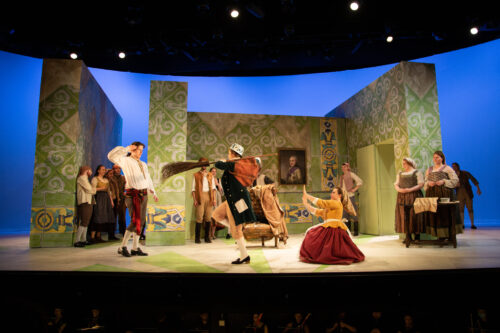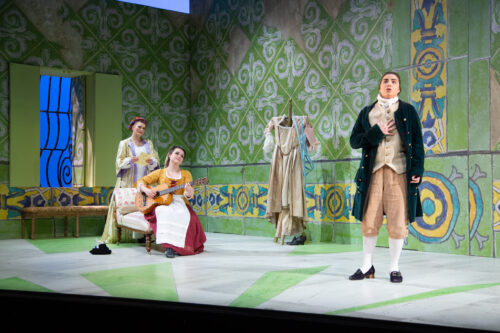 United Kingdom Mozart, Le nozze di Figaro: Soloists, Chorus and Orchestra of the Royal Northern College of Music / Peter Whelan (conductor). Royal Northern College of Music, Manchester, 30.3.2022. (MC)
United Kingdom Mozart, Le nozze di Figaro: Soloists, Chorus and Orchestra of the Royal Northern College of Music / Peter Whelan (conductor). Royal Northern College of Music, Manchester, 30.3.2022. (MC)

Production:
Stage director – Jonathan Cocker
Set and Costume designer – Bob Bailey
Lighting designer – Paul Botham
Choreographer – Bethan Rhys Wiliam
Chorus master – Kevin Thraves
Cast:
Cherubino – Melissa Gregory
Marcellina – Lila Chrisp
Count Almaviva – Emyr Jones
Figaro – Liam James Karai
Bartolo – Conrad Chatterton
Antonio – Thomas Ashdown
Susanna – Pasquale Orchard
Countess Rosina Almaviva – Georgie Malcolm
Basilio – Gabriel Seawright
Don Curzio – Henry Strutt
Barbarina – Emily Brown Gibson
Two women – Cherie Tse, Ellen Pearson
It was certainly gratifying to return to live opera following the easing of coronavirus pandemic measures and this Royal Northern College of Music (RNCM) production of Mozart’s masterpiece Le nozze di Figaro (The Marriage of Figaro) was a genuine tonic.
First staged in 1786 this enduring comedy favourite Le nozze di Figaro is a madcap excursion during a hectic twenty-four hours at the Almaviva castle a feudal estate near Seville, Spain. In the plot there is lots of activity including infatuation, secrets, infidelity, betrayal, disguise, concealment etc. Set on the wedding day of Figaro and Susanna, servants to the Count and Countess of Almaviva, who are undeterred by the philandering of the Count who wants to take Susanna for himself. Mozart’s librettist Lorenzo Da Ponte based his text on Pierre Beaumarchais’s controversial and subversive play La folle journée, ou le Mariage de Figaro (The Mad Day, or the Marriage of Figaro) from 1778 having agreed to the proviso of Emperor Joseph II to tone-down the politically sensitive references such as class privilege and social injustice.
One could sense how the student cast revelled in this comedy score chock full of arias, duets, trios and ensemble pieces many amongst the best known in the history of opera. In its clever libretto by the talented Da Ponte the men tend to act as buffoons whilst the women are by far the smarter of the sexes. As one might expect in Mozart’s world-famous comic opera a generous number the typical components are present including love, infatuation, secrets, infidelity, betrayal, disguise, concealment, tricks and revenge.
In 2019 I attended the acclaimed RNCM production of Vaughan Williams’s The Pilgrim’s Progress directed by Jonathan Cocker and set and costume designer Bob Bailey. For this production of Figaro it was pleasing to welcome back the Cocker and Bailey partnership who delivered a most successful staging. This creative team had the advantage of drawing together splendid rosters of soloists (there are two casts) and the one I saw and heard was actually the finest I have encountered in several years of reporting at student opera productions. Top marks to Bailey for his design of period costumes and set that seemed contemporaneous to Mozart’s. Simple but clever in design, Bailey’s set consisted of four large interchangeable rectangular panels on wheels which were moved easily around the stage.
In the title role of Figaro, valet to Count Almaviva and Susanna’s fiancé, Liam James Karai displayed his striking bass-baritone to potent effect. A touch stilted, Karai’s comedy acting is a work in progress although he slowly eased into the role, while coming across as more of an uncle to Susanna than her fiancé. Blessed with a rich, smooth and secure voice that made quite an impact I especially enjoyed Karai in Figaro’s famous act one cavatina ‘Se vuol ballare’ as he decides to scupper the Count’s plan to reinstate his right to sleep with Susanna on her wedding night.
For her all-round performance the star of the evening was soprano Pasquale Orchard, a bundle of energy who excelled as an ebullient Susanna, the lady’s maid to the Countess and fiancée to Figaro. Orchard’s singing and acting are hard to fault, and her characterisation and stage presence are engaging qualities that draw the audience in. Her high notes were confidently achieved, her lower register was effective too and her voice projected strongly through the hall. Best of all was her act four aria ‘Giunse alfin il momento… Deh vieni, non tardar’ as Susanna pretends to be alone and teases Figaro by singing of her love for the Count, while knowing Figaro is listening. Clearly ready for the professional stage, Orchard’s compelling portrayal with glorious singing epitomised the very essence of the role.
Emyr Jones took the role of lascivious Count Almaviva who wants to establish the old feudal custom and take Susanna to bed on the night of her wedding. This was the third time I have seen Jones in RNCM productions, and he gave as I expected a most reliable performance of the Count in his philandering activities. Gratifyingly performed by Jones was the Count’s third act aria ‘Vedrò mentr’io sospiro’ suitably enraged and ready to plot his revenge at overhearing Susanna and Figaro’s plans to outwit him.
A few weeks ago, the inaugural RNCM Williams-Howard Prize was won by soprano Georgie Malcolm with her pianist Edward Campbell-Rowntree receiving the Samuel Coleridge-Taylor first prize. In the role of Countess Rosina Almaviva, a character with two stunning arias, Malcolm sings beautifully with her noticeably smooth and pure tone standing out. With her meltingly beautiful ‘Porgi amor’ in Act II the Countess has one of the most celebrated of all Mozart arias. Malcolm sings gracefully and affectingly, and one could feel the Countess’s loneliness and sorrow as she lamented that her unfaithful husband has disregarded her and turned his attention towards her maid Susanna. Malcolm seems to gain confidence for her second aria ‘Dove sono’ in Act III as the Countess stoically, without malice, reflects on the times when she was happy with her husband. With ‘Dove sono’ the soprano produced a captivating performance of the tearful yet dignified Countess communicating convincing pathos. Malcolm might have lessened her upper body tension by holding a simple stage prop for example a posy, bonnet, parasol, fan, reticule, letter or book. Memorable from Act III was the esteemed duettino ‘Sull’aria’ where the Countess dictates a love letter to Susanna to send to the Count and trick him into meeting her. Known as the ‘Letter Duet’ this was gloriously sung by Malcolm and Orchard creating empathy and a sense of intimacy.

Another outstanding performance was given by Melissa Gregory as the cocky young page Cherubino, a favourite trouser role for mezzo-sopranos. Cherubino has two main arias, the first in Act I is ‘Non so più’ where the page ponders on his youthful desires for all women. Of the two arias my particular favourite is ‘Voi che sapete’ in Act II, one of Mozart’s best-known arias with its much-loved melody, which is supposed to be a song the page wrote himself declaring his love for the Countess. On the stage Cherubino’s aria has faux accompaniment by Susanna on the Countess’s guitar: Gregory excelled as the page displaying both her splendid voice and natural acting skills.
The comprimario roles were taken by a strong group comprising of Conrad Chatterton as Bartolo a doctor and lawyer, Lila Chrisp as Marcellina who is Bartolo’s housekeeper, Gabriel Seawright as the music master Don Basilio, Thomas Ashdown as Antonio the gardener, Emily Brown Gibson as the gardener’s daughter Barbarina and Henry Strutt the judge Don Curzio.
Under conductor Peter Whelan the Orchestra of the RNCM prospered with each section making telling contributions. Despite some early untidiness the overall ensemble of the orchestra improved significantly. For the recitative the singers were accompanied by a pleasing continuo consisting of cello and fortepiano. No problems whatsoever with the RNCM Chorus who responded effectively and alertly to chorus master Kevin Thraves.
Student opera productions are an important tradition at the Royal Northern College of Music and Jonathan Cocker’s staging of Mozart’s Le nozze di Figaro containing some promising talent is worthy of praise.
Michael Cookson
